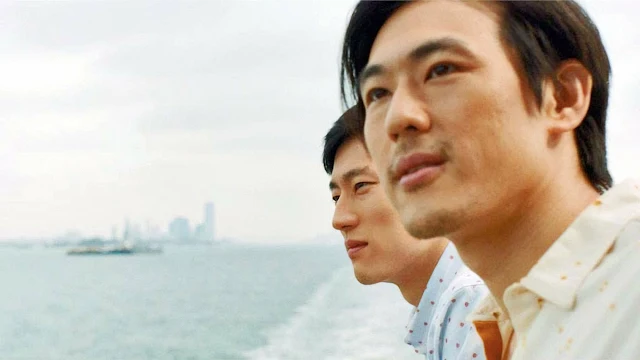 |
| Sul Kyung-gu and Moon So-ri in Oasis |
Cast: Sul Kyung-gu, Moon So-ri, Ahn Nae-sang, Ryoo Seung-wan, Choo Kwi-jung, Jin-gu Kim, Son Byung-ho, Ga-hyun Yun, Park Myung-shin, Park Gyeong-gyun. Screenplay: Lee Chang-dong. Cinematography: Yeong-taek Choi. Art direction: Jum-hee Shin, Kil Won Yu. Film editing: Hyun Kim. Music: Jaejin Lee.
Lee Chang-dong's Oasis seems to me a kind of great film, a phrase I don't use lightly, especially about one with scenes so painful that they tempted me to stop watching. At the same time, however, it also has scenes to which my response was a kind of astonished, even reluctant laughter. Lee's control of tone and mood is what tempts me to invoke greatness. When we first meet the protagonist, Jong-du (Sul Kyng-hu), he has just been released from prison after serving time for a hit-and-run that killed a man. (The truth about that incident of vehicular manslaughter is one that Lee keeps from us until a moment of low-key ironic surprise late in the film.) Penniless, wearing only a short-sleeved shirt on a frigid day, the slow-witted Jong-du tries to find his family, only to discover that they've moved away without telling him. The only way he can reconnect with them is by getting arrested. After they reluctantly take in the feckless, undisciplined, unemployable Jong-du, he then decides that he should do something to make amends with the family of the man who died in the hit-and-run. But they're not much better than his own family: They're in the process of moving, leaving behind Han Gong-joo (the amazing Moon So-ri), who suffers from severe cerebral palsy, under the care of her neighbors in a subsidized apartment house for disabled people. They regard Gong-joo as a source of supplemental income. And so the two outcasts, Jong-du and Gong-joo, are thrown together by the indifference and venality of their families. What develops between them could have been a mere sentimental fable about survival of the least fit, but Lee makes it much more with the help of two marvelous actors and a deft use of unexpected details, including touches of fantasy. It's a movie that should come with a multitude of trigger warnings, but for those who can take it, it's a memorable achievement.
.jpg)








